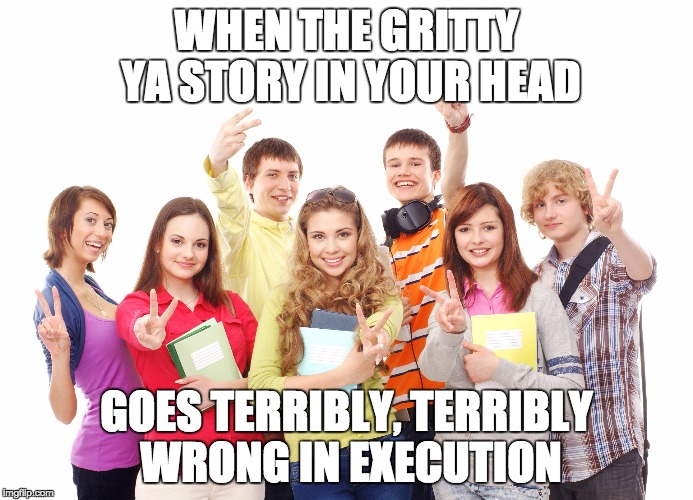It’s Cait again! The coup might be over, but I have now assumed squatters rights on Kristen’s blog. The fun part is that you never know when I’m going to pop up and come at you with stuff that is unusual, unsettling, and occasionally unnatural.
Today, I’m going to talk about writing young adult (YA) fiction. In the past decade, YA has experienced a renaissance and earned ‘theme park money’ for some lucky authors (I’m looking at you, sparkly vampire lady). Some YA has become incredibly sophisticated and gone to really challenging places both with its characters and subject matter (hello, dystopian-commentary-on-society and too-young-and-in-love-to-die-from-cancer books).
On the other hand, there is some really, really, really bad YA out there. Bathetic. Trite. Cringe-worthy.
The question is, how do we avoid all the traps and pitfalls that lead us to commit atrocities (i.e. write books) that are doomed to dwell in the 400,000 rankings on Amazon?
When Writers Need to be Grounded
When I wrote Downcast, I periodically went through my old yearbooks, notes I used to pass back and forth with my friends in classes, my old diaries from the time, and even a few of the papers I wrote for classes and kept for whatever reason. There was a method to my madness, because it’s absolutely madness to want to go back and torment yourself with looking at your yearbook photo from freshman year. (Note: if I get ten comments or more on this post, I will upload a copy of my freshman year photo…that is how much I believe in the cause…or something like that…)
The reason I delved not once, but multiple times into the memories of the micro-dramas and nostalgic optimism of my own high school experience was because it forced me to be realistic about teenagers, even the smart, responsible ones like myself. No other characters come with so much conflict and so many interesting limits already built-in simply by virtue of their age.
Let’s just list out the ways in which we are constrained as writers in working with teenage characters:
- Teenagers live at home with their parents or other legal guardian figure;
- Teenagers attend school Monday through Friday from 8:00 a.m. to 3:00 p.m.;
- Teenagers must face and deal with the same people every day (other students, teachers, etc.);
- Teenagers may or may not be able to drive;
- Teenagers have curfews at night;
- Teenagers generally have a limited income (after-school job, chores, etc.); and,
- Teenagers have only had so much life experience in their 14-18 years and therefore almost everything can be and is new for them.
Of course, as writers, we get to break all those rules and constraints if we want. However, as every teenager will tell you, breaking the rules has consequences. The convenience of doing so is a slippery slope of permissiveness, and each exception pulls the character a little further away from reality and being easily identifiable with by the reader. There has to be a really good reason to change one of the baseline constraints for a YA character, and just because we are too lazy to figure out how to work within that particular restriction.
One of the early beta critiques of Downcast complained that it was boring to have the characters going to school every day, that it was…wait for it…repetitive. While I took that particular critique and beta reader with a grain of salt, I didn’t entirely discount her opinion. I knew that given my plot and world-building, there was no reason for these students not to be in school. Instead, I took the idea of repetitiveness and pushed it, turning the school week into something that was inescapable and claustrophobic. The protagonist had to face her tormentors every single day. There was no reprieve, no “I don’t feel like going to work so I won’t” choice. Thus, when things break down the structure and routine, it’s not just a variation. It’s cataclysmic and amps up the tension in the plot.
Like OMG!
So, we’re writing YA. We need to be au courant with the vernacular, the fads, the apps (Vine is sooooo 2015), and the fandoms. However, we run the danger of forgetting we are the grown-ups in this situation.
What does that mean?
It means don’t dumb it down.
Just because we are writing for young adults, we are not automatically required to use words of only two syllables and simple sentence structures. We obviously want to hit the right balance between clarity and casualness, eliminating a lot of the ‘like’s’ and ‘um’s’ that pepper both adult and teenage conversation. That doesn’t preclude the use of a broader, richer vocabulary or taking advantage of the full range of grammatical tricks to create provocative, evocative prose.
While being careful to avoid the verbose pomposity of obstreperous troglodytes, there’s no reason we can’t use words that teenagers might be unfamiliar with, provided we do so naturally and with context that suggests the meaning of the word in a way that mimics the organic process of learning language. YA shouldn’t just be engaging and challenging in the concepts it presents. Teenagers that read YA are at an age where reading should be both a pleasure and a learning experience, driving emotional and intellectual growth.
Also, we need to make sure that the emotions, motivations, and decision-making processes of our characters are easily relatable but not carelessly simplistic. A lack of life experience doesn’t mean that teenagers don’t have complex psychologies (just ask anyone with a teenager), even if they don’t have the vocabulary yet to explain fully.
We must respect our readers, no matter their age, and in return, they will respect us…even if they are teenagers
The Bell May Have Rung, but Class is not Dismissed!
Well, actually, class hasn’t even started yet.
Not surprisingly, I have SO much more to say on YA fiction. Therefore, I am teaching a W.A.N.A. class on it. Here’s the class description and where you can sign up. It’s gonna be totally fun.
As long as there are teenagers, there will be a demand for angst-ridden, unabashedly romantic YA fiction. Whether the story is paranormal, dystopian, fantasy, or everyday literary, YA demands the author walk a tightrope between realistically capturing the young adult voice and meeting some very grown-up standards in terms of plot, characters, and style.
Who wants to sound like a tax-paying grownup with a minivan pathetically trying to sound like a teen? Yeah. No one. But it happens ALL the time.
This class will discuss some of the critical issues in crafting a story and characters that truly resonate with the YA audience. Topics include:
- Talking like a teenager without describing like a grown-up (or sounding like a dumb@$$)
- Tip-toeing through the minefield of sex and swearing
- Tropes, types, and technology
- Techniques for getting in the mindset to write a YA POV
- Teenage-level decision-making skills vs. Too-Dumb-to-Live decisions
REGISTER HERE!
****Just FYI, in an effort to combat spammers your comment won’t appear until I approve it, so don’t fret if it doesn’t appear right away.
Talk to me! And MAKE SURE to check out the classes below and sign up! Summer school! YAY!


















13 comments
1 ping
Skip to comment form
I teach high school kids, and their vernacular changes by season and region. Half the time I feel like I need an interpreter. The one consistency: those ums and likes that you mention.
For decades, I ducked reunions due to an undefined ennui. Then I fought myself into committing to a high school reunion. To get a sense of the people, all but 2 I’ve never seen in decades, I decided to pull my yearbooks to try to place names with faces. What I discovered was the source of my ennui. …and the reason I went to the College furthest away but still affordable…
Probably channeling the times when sarcasm replaced satire, satire replaced communication, and to be cool was to be cruel, the majority of the comments were to put it mildly, unkind.
As a protection of my psyche, I had forgotten all of my Junior High and High School ‘career.’ As I get in touch with it. I find much of the core of my writing.
Yes, I did go to a High School reunion, 15 years later. The bullies were my best friends. The only person to hit me in the face sought me out and used me to buffer the rest of the crowd. The jocks were noticeably absent, “people made fun of their wearing Letter Jackets at the 5th and 10th reunions and we haven’t seen them in decades (the athletes.)
Thank you for the tips on YA novel writing. I am currently revising a MS, and would love to have my name added to the drawing.
Promising.
I’d agree with Amy, teens Um and Like a lot… and I think it’s simply reaction time. They don’t have the experience to finish their sentences as quickly as they want, and they know the kids they talk with will jump in if they slow down, so this is how they give themselves time to think and hold onto the mic.
One fun approach to teenspeak has been Buffy-speak. The kids on Buffy the Vampire Slayer used elaborate or fumbling sentences and creative images that could go just about anywhere in their quest to make their point (“Anyone else feeling we’ve been Kaiser Soze’d?” “You’d have to go somewhere that’s away.”) They gave the feel that these were (exceptionally) smart and eloquent kids who just never learned the ordinary way to say something and now are scrabbling for the right words. An unrealistic mix for most kids, but never conventional or boring.
An interesting piece, Cait. I’m glad I don’t write deliberately YA books (though I know teens have read and enjoyed mine). My books are decidedly adult in language and themes.
The comment from one of your beta readers about school attendance made me realise something. In my school years, back in the sixties, books aimed at school age readers fell into two groups.
Group one – There were those that were adventures based on thrills and spills, like war stories (Biggles etc.), Sci-Fi and space stories, historical conflicts and similar (think Robin Hood etc.), or sporting adventures (This is from a male perspective).
The characters were mainly adults, even if the writing was geared towards a younger reader in terms of graphic violence, sex, and other matters.
Group two – The other books were about school aged characters, and as such fell into two separate camps; school stories, and what I’ll call ‘out of school’ stories.
School stories, for both sexes, were about school life… often set in boarding schools to get rid of parental influence and provide a little bit of ‘different world’ for most of us who lived at home with Mum and Dad. The characters’ day to day problems and activities were mixed with capers and scrapes, dilemmas and ambitions, rivalries and bonding, to produce plots that entertained young minds. Examples of this are Buckeridge’s ‘Jennings’ stories, or the number of girls’ school series that were around.
‘Out of school’ stories usually took place during the summer holidays (occasionally during the Christmas break) with groups of kids away from home having adventures while camping, boating, or just hanging out in their free time. Series like Enid Blyton’s ‘Famous Five’ and ‘Secret Seven’ books, or Ransome’s ‘Swallows and Amazons’ epitomise these kinds of stories.
There was a sub genre to all these groups and sub groups; the detective or police story. These would be either mysteries or action based (like their adult market equivalents) and fitted more into group one, or they involved youngsters as characters ‘showing the police how it’s done’, often within the plots of the school story or out of school story.
I’d forgotten the books where the young character has been forced or has chosen to be away from school and parents. From Huckleberry Finn, through W. H. Canaway’s ‘Sammy Going South’, to the brilliant ‘Heart of the Ocean’ by Jean Taylor, which I had the privilege to edit (She’s published by my own publisher, who I also do some editing for.) https://www.amazon.com/product-reviews/B012H0C1MU/ref=cm_cr_arp_d_show_all?k=Heart+of+the+Ocean&showViewpoints=1&reviewerType=all_reviews&pageNumber=1
I’m sure there are other books about runaways and refugees… or castaways like in Golding’s ‘Lord of the Flies’. The possibilities for ditching the realities of home and school life are endless really, if that’s what you want.
Loved your post. I am writing YA. Never thought to return to yearbook or keepsakes in my cedar chest. Bits of memories popped up while i read. A child of the 60’s, i wrote poems about Viet Nam war civil rights,and women’s lib. Teens must be passionate in today’s political society too. Put some Motown on that victrola and feel the pain.
The situation can be different for YAs in fantasy worlds. On the other hand, my teenage MC still has to deal with an overbearing parent-figure, boring lessons when she’d rather be doing something that matters, and the frustration of being treated like a kid when she feels like an adult.
Thanks for a great article, Cait! I am thinking of re-reading my novels I wrote in high school to get back into the YA voice.
We’ll see how it goes…. *cringes*
OMG! The timing on learning to talk all feek couldn’t be better (and this is a good example of why).
I love this post, and all of your courses sound amazing! I found your site via an FB writing group I’m part of, and I’m so glad I did! I’ll be following you now, for sure.
There are 10 comments, and no freshman photo. Just saying …
I opened this to find out what fleek means, and no joy. Or will you cover that next time?
OMG! I love the article, you’re my new BFF and BTW that might, like, change tomorrow ’cause, like, I have so many GFs.
GTGFN bu-bye
I have a thirteen-year-old, can you tell?
Please add my name to the pile.
TY
[…] https://authorkristenlamb.com/2017/07/writing-totally-on-fleek-ya/ Don’t dumb things down! […]